Describe afterload - Study guides, Class notes & Summaries
Looking for the best study guides, study notes and summaries about Describe afterload? On this page you'll find 837 study documents about Describe afterload.
Page 4 out of 837 results
Sort by
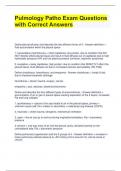
-
Pulmology Patho Exam Questions with Correct Answers
- Exam (elaborations) • 15 pages • 2024
-
- $13.99
- + learn more
Pulmology Patho Exam Questions with Correct Answers Define pleural effusion and describe the two different forms of it - Answer-definition = fluid accumulation within the pleural space 1. transudative (hydrothorax) = intact capillaries, low protein, due to condition that DO NOT directly affect pleural tissue and result in fluid diffuses out of capillaries due to high hydrostatic pressure (HF) and low plasma proteins (cirrhosis, nephrotic syndrome) 2. exudative = leaky capillaries, high ...
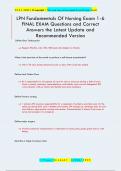
-
LPN Fundamentals Of Nursing Exam 1-6 FINAL EXAM Questions and Correct Answers the Latest Update and Recommended Version
- Exam (elaborations) • 24 pages • 2024
-
- $12.49
- + learn more
Define Sinus Tachycardia → Regular Rhythm, rate 100-180 beats/min (higher in infants) When is the best time of the month to perform a self-breast examination? → 4th to 7th day during menstrual cycle or days after cycle has ended. Define total Patient Care → Rn is responsible for all aspects of care for one or more pts during a shift of care. Care is usually consistent, comprehensive, and holistic, care can be delegated. RN works directly with pt, family and health care team member...
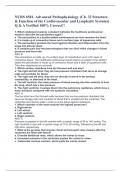
-
NURS 6501- Advanced Pathophysiology (Ch. 32 Structure & Function of the Cardiovascular and Lymphatic Systems) Q & A Verified 100% Correct!!
- Exam (elaborations) • 10 pages • 2023
- Available in package deal
-
- $13.49
- + learn more
NURS 6501- Advanced Pathophysiology (Ch. 32 Structure & Function of the Cardiovascular and Lymphatic Systems) Q & A Verified 100% Correct!! 1. Which statement made by a student indicates the healthcare professional needs to describe the pericardium again? a. The pericardium is a double-walled membranous sac that encloses the heart. b. It is made up of connective tissue and a surface layer of squamous cells. c. The pericardium protects the heart against infection and inflammation from the l...
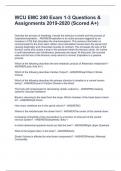
-
WCU EMC 240 Exam 1-3 Questions & Assignments 2019-2020 (Scored A+)
- Exam (elaborations) • 9 pages • 2024
-
Available in package deal
-
- $10.99
- + learn more
WCU EMC 240 Exam 1-3 Questions & Assignme Describe the process of breathing. Include the stimulus to breath and the process of inspiration/expiration. - ANSWERInspiration is an active process triggered by an increase in CO2 that stimulates the chemoreceptors. This sensory information is communicated to the brain stem. Motor nerve stimulation travels down the spinal cord causing diaphragm and intracostal muscles to contract. This increases the size of the thoracic cavity and causes a drop in the...
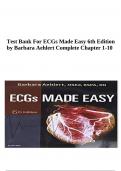
-
Test Bank For ECGs Made Easy 6th Edition by Barbara Aehlert Complete ALL Chapter 1-10 (2023-2024)
- Exam (elaborations) • 138 pages • 2023
-
- $28.49
- + learn more
The apex of the heart is formed by the . a. tip of the left ventricle b. tip of the right atrium c. right atrium and right ventricle d. left atrium and left ventricle ANS: A The heart’s apex, or lower portion, is formed by the tip of the left ventricle. The apex lies just above the diaphragm, between the fifth and sixth ribs, in the midclavicular line. OBJ: Identify the surfaces of the heart. 2. The left atrium receives blood from the . a. pulmonary veins b. aorta c. pulmonary arte...
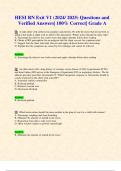
-
HESI RN Exit V1 (2024/ 2025) Questions and Verified Answers| 100% Correct| Grade A
- Exam (elaborations) • 51 pages • 2024
-
Available in package deal
-
- $11.99
- + learn more
HESI RN Exit V1 (2024/ 2025) Questions and Verified Answers| 100% Correct| Grade A Q: A male client with cirrhosis has jaundice and pruritus. He tells the nurse that he has been soaking in hot baths at night with no relief of his discomfort. Which action should the nurse take? A. Encourage the client to use cooler water and apply calamine lotion after soaking B. Obtain a PRN prescription for an analgesic that the client can use for symptom relief C. Suggest that the client take brief showe...
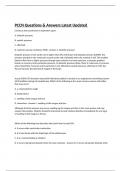
-
PCCN Questions & Answers Latest Updated
- Exam (elaborations) • 72 pages • 2023
- Available in package deal
-
- $12.99
- + learn more
Coronary artery perfusion is dependent upon: A. diastolic pressure B. systolic pressure C. afterload D. systemic vascular resistance (SVR) - Answer A. diastolic pressure Diastolic pressure in the aortic root is higher than left ventricular end-diastolic pressure (LVEDP), the pressure exerted on the ventricular muscle at the end of diastole when the ventricle is full. This enables blood to flow from a higher pressure through open arteries to a lower pressure, a pressure gradient known as cor...
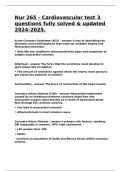
-
Nur 265 - Cardiovascular test 3 questions fully solved & updated 2024-2025.
- Exam (elaborations) • 35 pages • 2024
-
- $14.99
- + learn more
Acute Coronary Syndrome (ACS) A way of describing the disorders and manifestations that make up unstable Angina and Myocardial Infarction. • Describe any conditions characterized by signs and symptoms of sudden myocardial ischemia Afterload The force that the ventricles must develop to eject blood into circulation • The amount of resistance against which the hearty must pump to get blood into systemic circulation Previous Play Next Rewind 10 seconds Move forward 10 se...
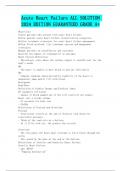
-
Acute Heart Failure ALL SOLUTION 2024 EDITION GUARANTEED GRADE A+ Objectives
- Exam (elaborations) • 12 pages • 2024
-
- $12.99
- + learn more
Objectives Assess patients who present with acute heart failure Define general acute heart failure classification categories Outline treatment strategies for acute heart failure management Define fluid overload; list treatment options and management strategies Manage patients on vasodilators and inotropes Describe the impact of treatment(s) on outcomes Heart Failure Definition - Physiologic state where the cardiac output is insufficient for the body's needs OR: - The heart is unable t...
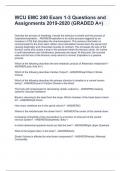
-
WCU EMC 240 Exam 1-3 Questions and Assignments 2019-2020 (GRADED A+)
- Exam (elaborations) • 9 pages • 2024
-
Available in package deal
-
- $11.99
- + learn more
Describe the process of breathing. Include the stimulus to breath and the process of inspiration/expiration. - ANSWERInspiration is an active process triggered by an increase in CO2 that stimulates the chemoreceptors. This sensory information is communicated to the brain stem. Motor nerve stimulation travels down the spinal cord causing diaphragm and intracostal muscles to contract. This increases the size of the thoracic cavity and causes a drop in the pressure inside the thoracic cavity. Air r...

That summary you just bought made someone very happy. Also get paid weekly? Sell your study resources on Stuvia! Discover all about earning on Stuvia


